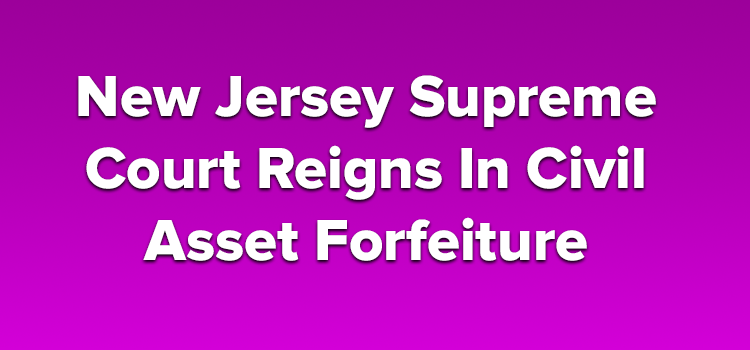In State v. Luis Melendez, (A-22/23-18/081246) (Decided January 8, 2020), the Supreme Court of New Jersey held that statements made by a suspected drug dealer in response to a civil forfeiture complaint could not be used against him in a related criminal proceeding. In reaching its decision, the court emphasized that the defendant “faced an untenable situation — forced to choose between his Fifth Amendment right against self-incrimination and his right not to be deprived of property in the forfeiture matter without due process.”

Facts of State v. Luis Melendez
In the course of an investigation into drug sales by defendant Luis Melendez, police executed a search warrant in November 2010 at an apartment where an informant had purchased drugs from defendant. The search focused on a bedroom where drugs, weapons, and items bearing Defendant’s name were found, along with $2900 in cash. Defendant was arrested and charged with various narcotics and weapons offenses.
A month later, the same office prosecuting the criminal case against Defendant filed a civil forfeiture complaint seeking to forfeit the $2928 in cash and alleging the funds were proceeds of illegal activities for which defendant had been charged criminally. The Defendant was served with a copy of the complaint; however, the State did not serve a copy on the attorney who represented defendant in the parallel criminal proceeding.
In April 2011, Melendez represented himself and filed an answer to the forfeiture complaint. He objected to the forfeiture of the $2928 and asserted that he had proof that the “funds were not part of or derived from any criminal activity,” but rather “were the balance of [defendant’s] inmate account while serving federal incarceration time. Therefore, they are not subject to forfeiture.” Over the Melendez’s objection, the State admitted his answer to the forfeiture complaint at his criminal trial to “show a nexus between” Defendant and the contraband found in the apartment. At trial, the court took judicial notice of the civil forfeiture action against defendant and the $2928 seized, and of defendant’s answer. The prosecutor read aloud to the jury defendant’s answer to the civil forfeiture complaint. Defendant was convicted of the ten counts submitted to the jury; three counts had been dismissed.
The Appellate Division found no Fifth or Sixth Amendment violation but “conclude[d] that the entire chain of events in connection with the forfeiture case violated principles of fundamental fairness.” As a result, the court found that defendant’s answer in the forfeiture case should not have been introduced in his criminal trial. Because of other evidence, the court nevertheless concluded the error was harmless.
Court’s Decision in State v. Luis Melendez
The New Jersey Supreme Court ruled that a civil forfeiture complaint can’t be introduced against a defendant in a related criminal trial. However, in this case, it found the error was harmless given the weight of the evidence against the Defendant. Chief Justice Stuart Rabner wrote on behalf of the court.
In support of its decision, the New Jersey Supreme Court relied heavily on Garrity v. New Jersey, 385 U.S. 493 (1967). In that case, the U.S. Supreme Court reversed the convictions of officers who were given a choice “either to forfeit their jobs or to incriminate themselves” in the course of an investigation into their alleged misconduct. The Court likened the practice to the interrogations it reviewed in Miranda and found the officers’ statements “were infected by . . . coercion.” Accordingly, the Court held the statements were not voluntary and could not be admitted at a later criminal proceeding.
Here, the defendant was given the same unfair choice, according to the New Jersey Supreme Court. “Like the defendants in Garrity, claimants in a civil forfeiture action who are defendants in a parallel criminal case also face an untenable choice: to forfeit their property or incriminate themselves,” Chief Justice Rabner wrote. “In other words, to assert their constitutional right not to be deprived of property without due process, they have to link themselves to alleged contraband and give up their constitutional right against self-incrimination. Or they can refuse to answer and lose their property.”
“A criminal defendant’s statements in an answer to a civil forfeiture complaint thus cannot be considered voluntary,” added Rabner. “As a result, they cannot be introduced in the State’s direct case in a later criminal proceeding.” The New Jersey Supreme Court also held that criminal defendants who have been served with civil forfeiture complaints are entitled to enhanced notice of certain issues. In its opinion, the court advised that defendants should be advised of the following: (1) they may wish to consult with a lawyer about how best to proceed; (2) the State may not use any statements made in an answer to a forfeiture complaint in its case in chief in a related criminal case; and (3) defendants may file a motion to stay the civil forfeiture action under N.J.S.A. 2C:64-3(f). It further held that “[whenever practicable, the State should also serve a courtesy copy of the forfeiture complaint on defense counsel when a companion criminal case is pending, so that counsel can offer basic legal advice or make a referral.” The court also referred the matter to the Civil and Criminal Practice Committees for further review.
